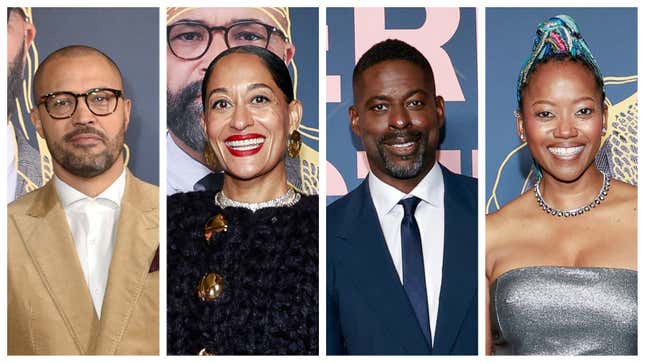
In “American Fiction,” the feature directorial debut from The Root alum Cord Jefferson, Jeffrey Wright stars as as Monk, a frustrated novelist who’s fed up with the establishment profiting from “Black” entertainment that relies on tired stereotypes and offensive tropes.
To prove his point, Monk uses a pen name to write an outlandish “Black” book of his own that, much to his shock and displeasure propels him to the heart of hypocrisy and the madness he claims to disdain. And if that wasn’t enough, thanks to a forced “Sabbatical,” Monk also has to contend with complicated family dynamics, grief and a budding relationship back home that hinges on whether he not he can show up as his full self.
Joining Wright is an all-star cast which include Issa Rae, Leslie Uggams, Tracee Ellis Ross, Erika Alexander and Sterling K. Brown. The latter three and Jefferson recently spoke to The Root during the Los Angeles premiere of the film where they discussed what excites them most about the future of Black storytelling and more.
For the former Root staffer, he explained how he initially thought his film wasn’t going to get made but he hopes the success it’s garnered thus far will be enough to convince the powers that be to let him continue in creating something as “left of center” like this again.
“Right now, we’ve got such great momentum, such great reviews. We’ve got such a positive response from so many different kinds of people. To me, hopefully, that success and whatever success comes after it is enough that they’ll ket me try to make something else,” he said before later adding: “I want to keep trying to push things forward a little bit.”
When it comes to Alexander, her excitement lies in the expansion of Black stories and storytelling in that it encompasses viewpoints from and alliances with our brothers and sisters all across the diaspora and the world at-large.
Describing it as a “global” moment, she went on to share:
For a very long time, we haven’t had to compete. But people now, with new technology and different types of skillsets are coming to challenge. And I think that that steel sharpens steel and I look forward to seeing what collaboration.
But also, Rome didn’t stay Rome. So in order for us, I think, to manage all this we need to find ways to transform, resurrect, and also redirect some of our ‘me, me, me’ and ‘I’m this and I’m that’ to ‘what are other people doing and how can I contribute?’ And what types of things are we putting out into the world, are they worthy of our time and everyone else’s.
The aforementioned notion of putting out stories worth telling and stories that illustrate the expansive nature of what it means to see and know ourselves onscreen is something that Ross also shared. In speaking with The Root, she told us that that was a large part of the allure for “American Fiction” along with the exploration of the “contradiction that happens between how you see yourself versus how the world sees you and how you navigate that journey.”
Further speaking to that contradiction, Brown made it abundantly clear that while certain mainstream portrayals of Black life may put forth images that show the “stereotypical” parts of our story—they still hold immense value despite not being painting a holistic picture of who we are as a people.
“Boyz n the Hood,’ ‘Menace II Society,’ ‘12 Years a Slave,’ ‘Roots’ —all have impacted me in profound and beautiful ways. They are parts of our story, they are not the totality of our story,” Brown elaborated. “So the idea is sometimes, if we tell these stories over and over again, the mainstream public thinks that’s the totality of who we are. So when they meet somebody who doesn’t fit into that particular box, they tend to say like ‘oh, well you’re not like Black, Black. You’re different. You don’t talk the way that Black people talk. And it’s like ‘really? ‘Cuz I’m Black and this is how I’m talking.’ So the desire to see a plethora of our experience, to have our humanity fully shared is something that’s not just good for us—it’s good for the world.”
“American Fiction” is in select theaters now, opening widely in January 2024.

